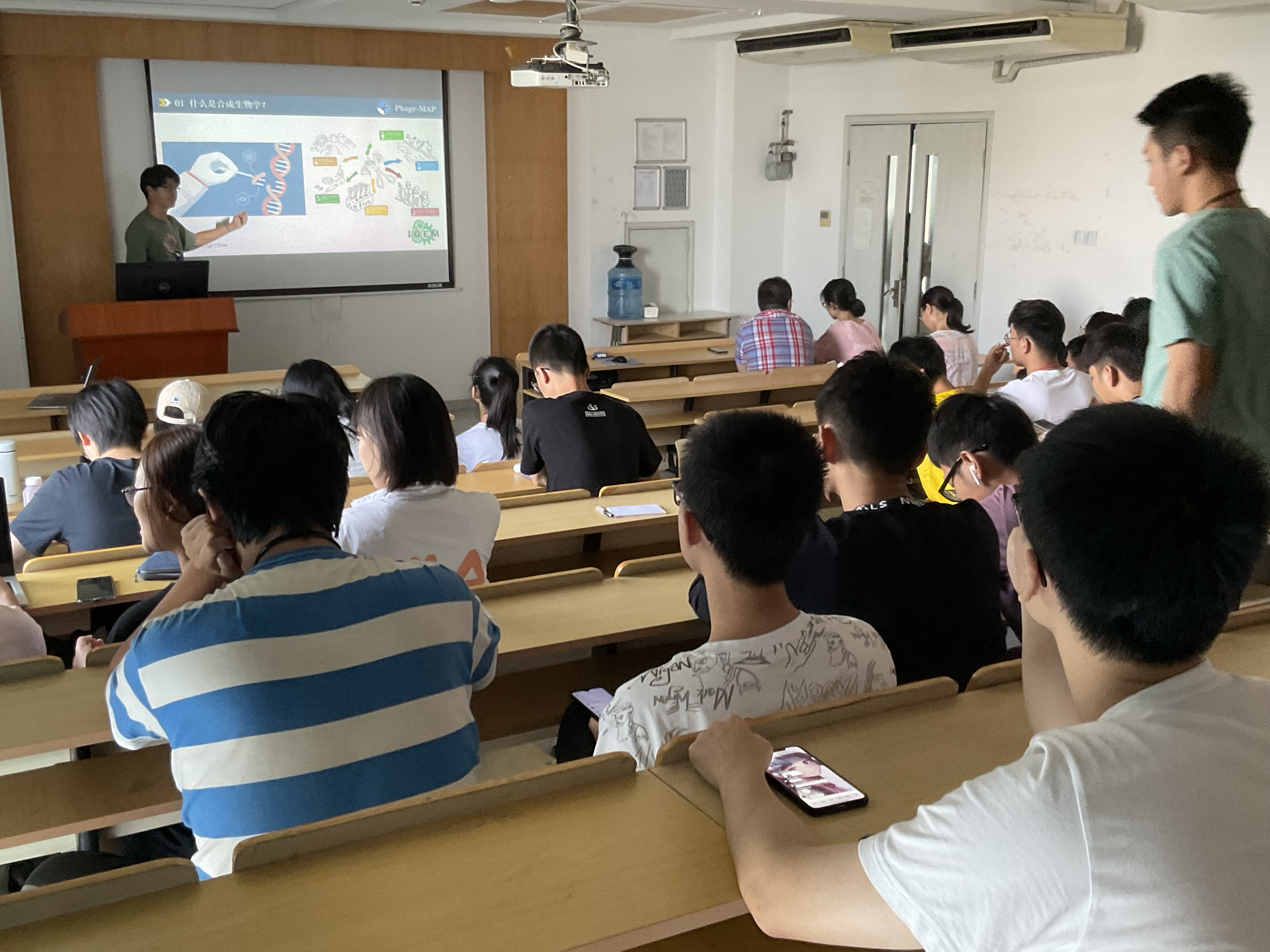


-
Questionnaire
-
Seeding Program
-
Innovation Club
-
WeChat Official Account
-
Bilibili Publicity
-
Mini Game
-
Popular Science Webpage
-
Ending Wording
COMMUNICATION
We firmly believe that communication with society is the fundamental pillar of Science Communication, a way to build bridges to link science to society. Despite lots of efforts scientists and researchers have made for it, we realized there is still so much misunderstanding and knowledge gap between research community and public. As fellow researchers, we felt it our responsibility to communicate scientific knowledge related to synthetic biology and our project to the public in an easy to understand form.
★Questionnaire
Before starting the popular science education part, we made a relevant questionnaire to determine the form and audience of our communication. Our questionnaire mainly investigated the public's understanding of synthetic biology, bacteriophages and superbacteria, and further investigatd the public's attitude towards these. We collected 858 questionnaires. For details of the questionnaire results, please go to human practices.
In Q12 of Questionnaire, we can observe that although some people are unwilling to continue learning more relevant knowledge, most people prefer to continue learning. They do not tend to be too professional and have a high acceptance of video and article teaching. Therefore, in the process of popular science education, we payed more attention to the production of videos and the writing of articles. Hope to expand public cognition and provide support for the development in this field of synthetic biology.


Figure: Results of questionnaire No.10-12
★Seeding Program
"Seeding Program", also named "Outstanding Pre-training Project", is a characteristic enrollment program at Tongji University. On July 3, with the help of professor Zhang and professor Leng, two iGEM teams of Tongji University (Tongji_China & Tongji_Software) participated in the "Seeding Program" of the College of Life Science and Technology, as in previous years Activity. The seeding program of Tongji University mainly targets high school students. In the previous questionnaire, our ideal audience is high school students and undergraduates. Therefore, we attach great importance to this activity. As the program named, our efforts make them interested in synthetic biology, leaving a seed in their heart.

Figure: The Seeding Program
In this activity, we introduced the basic knowledge of synthetic biology and gave some vivid examples. Such as painting with bacteria, circuit in synthetic biology, etc.

Figure: Bacterial painting

Figure: Schematic diagram of gene circuit
Since the participants of our team in this activity are bioinformatics majors, so we also introduced the application of bioinformatics in synthetic biology, such as computer-aided drug design, biosensor design and so on. Most of our listeners were first exposed to bioinformatics and synthetic biology and showed great interest.

Figure: Jun Wang was introducing bioinformatics
Then we introduced superbacteria, the Nobel Prize in chemistry in 2020, the application of CRISPR system in the field of gene editing, and finally introduced our project, Phage-MAP. From the source of phage therapy, we talked about our data processing process and the final expected application effect. They said it was a new idea they had never heard before. We're glad to be able to let them know that.

Figure: Project background - the birth of superbug
In addition to systematically introducing synthetic biology and iGEM competition, considering that the students from "Seed Program" are about to enter the third year of senior high school, we shared our daily life as students of biological sciences and focus on the scientific research and learning life in the University.

Figure: We encourge students study of various skills in University
At the end of the program, the students communicated freely with us for some time. We were glad to see that those students indeed gained a lot from our introduction. We believe this communication was of great benefits for their later major selection.
★Innovation Club
At the activity held by the Innovation Club of the College of Life Science and Technology, Tongji University, we introduced the application of synthetic biology in daily life and our project. Compared with the high school students in the previous Seeding Program, undergraduates have a deeper biological background, but they also found for the first time that synthetic biology has so many applications in our daily life, such as the production of food, industrial products and drugs. And that's why we want to popularize synthetic biology to them.


Figure: Introduce synthetic biology to undergraduates
In this activity, we also introduced our popular science web pages and game, which won unanimous praise. These two parts will be described in detail later.


Figure: Undergraduates were watching popular science pages and games
★WeChat Official Account
The WeChat Official Account is one of the most widely used media platforms in China. We have published some articles on it for the promotion of synthetic biology, IGEM and Phage-MAP. We do our best to make our tweets easy to understand because we want them to be educational. We use many pictures and examples in our tweets so that even primary school students who know nothing about biology can know what we are doing.


Figure: Our wechat official account
★Bilibili Publicity
BiliBili is a cultural community and video platform for the young generation, which has a great influence on young people in China. Many users upload their videos and communicate here. You can understand it as Chinese "YouTube". We hope that through this platform, more people can see what we are doing and will be interested in this.


Figure: Our bilibili account
★Crispr-related Manual
In order to explore the application of CRISPR and possible problems, we discussed with other iGEM teams at the CRISPR conference held by Tianjing University. For details of the conference, please click the Crispr-related Manual.
we hope this manual can help the iGEMers in the future.

